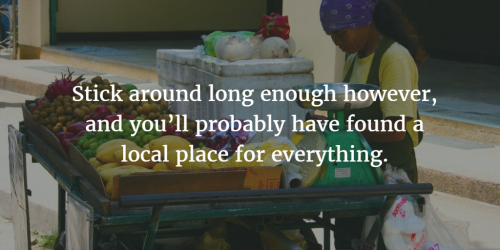Few things in life can change a person as much as living in a foreign country. Expats who have eventually returned home are particularly – and sometimes painfully – aware of how much they’ve changed. But until they do that, most expats don’t realize how much expat life has changed them – until one day there’s a clear sign staring them in the face. Here are ten things that may tell you that you’ve been an expat for too long.It takes you a long time to answer the question “Where are you from?”
For most people, it’s an easy enough question to answer. You’re from a particular city or town or part of the country, and if you’re travelling abroad, you usually answer with your country of origin. For people whose parents have migrated, either internationally or within their own country, things can get a little more complicated, but it’s still usually simple enough.

For long-term expats however, there’s no quick and easy answer to the question “Where are you from?” This is especially true if you’ve spent a substantial amount of time in each of the various countries you’ve lived in. If you’ve grown up in the United Kingdom, spent five years studying in Germany, ten years working in Australia, eight years in South Africa, and are now in Vietnam, where exactly are you from? It can take a while to figure that out for yourself, let alone explain it to someone else. If your parents themselves were expats or immigrants, good luck answering the question in less than an hour. And if you also have children, imagine how long it’ll take them to explain where they’re from, especially if they’ve inherited your wandering genes.
When there are local landmarks you’ve been “planning to see” for way too long
Pick any place, and it’s usually the outsiders who have seen its sights. Tourists come in with long lists of sights they want to see, and pack most of them into the space of a couple of days. Regardless of the merits of this kind of tourism and sightseeing, the fact is that they’ve usually seen more of a place than the local residents, at least in terms of major, iconic landmarks and destinations. The locals, meanwhile, are living their busy lives, and getting through their list of things and places to see very slowly, if at all.
They know the best cheap restaurants, the local markets, the best deals on local crafts, the best little local bar, and plenty more, but they probably haven’t been to the local museum, castle, fort, or nature reserve, and if they have, it was a good long while ago. Expats tend to do the tourist thing in the initial days, when everything is new and exciting, but soon enough they too become local residents.
Visiting home feels like going abroad
The most successful expats, the ones who find the expat life most rewarding, are typically the ones who fully throw themselves into the expat experience, embracing the local culture and way of life. Of course, adapting to the local way of doing things means you stop doing things the way you used to back home – which is great as long as you’re away from home, but gets a little complicated when you go to visit.

When you’ve been an expat long enough, visiting your own country doesn’t quite feel like going home but like travelling abroad. The weather is strange, everyone’s driving on the wrong side of the road, they’re talking funny, eating food that you’re not used to, and they’re just doing everything very differently from you. In fact, just the fact that you don’t stick out any more might also feel a little strange. On the other hand, if your accent has changed, you might get a few strange looks too, and people may ask you where you’re from. You might also find yourself disappointed and upset by cuisine that is supposedly from your new home but you recognize as some strange hybrid – “Korean food? This certainly isn’t Korean!”
You go up to other expats not to ask for help but to offer it
There was a time when you’d keep an eye out for other expats and earnestly milk them for information and advice, even if they’d been around barely a week longer than you had. But that was back when you were fresh off the boat, both excited and intimidated by everything your new home had to offer you. Now that’s a distant memory. You’ve well and truly settled in, and things work the other way around – you’re the wise old expat in the community, the one who is sought out by the newcomers for tips and advice.
If you’re the friendly, nurturing sort, you might even go up to the new arrivals before they come to you. There are few problems you haven’t seen or don’t know how to handle. You might even take this role into the virtual world, offering your help and perspective on the various online expat communities.
You speak several languages – sometimes in a single sentence
Learning the local language is something that every expat ought to do, even if they don’t really need to. Many expats make the mistake of not bothering to learn the local tongue, which cuts them off from a huge number of experiences and opportunities. The best way to learn the local language is to take a course well in advance, and then practice it in the real world with locals when you get to your destination. However, plenty of expats simply pick up languages in bits and pieces over time, with no formal training. Whichever way they choose to do it, the ones who learn the local language are the ones who last and who get the most out of their expat experience.

Eventually though, long-term expats accumulate a repertoire of several languages, and many get into the habit of speaking them all together – a sentence may have phrases from three or four different languages! Your spouse and children might be able to understand you, but for everyone else, you might need to repeat and explain yourself surprisingly often.
You root for your adopted country in sports
Sports loyalties are a strong indicator of where you belong. When you find yourself rooting for your adopted country – and not just out of politeness – you know that your loyalties have shifted, or at least that they’re split.
A new expat can usually watch a match fairly dispassionately, even while thoroughly enjoying it. Eventually however, you’re emotionally invested enough that a loss can send you crashing into dejection and a win can keep you floating for several days. You might even find that you’re interested in a sport you’d barely even heard of before you arrived – if you’re a Canadian in Pakistan, watching cricket and screaming at the home team, you’ve certainly been away from home too long. The most interesting situation is when your adopted country is playing your home country – who do you root for then?
Your family and friends back home laugh at your accent
This of course happens when enough local people speak your own language. It’s probably most common among English-speaking expats in countries where English is widely spoken, and Spanish-speaking expats also face it to some extent. If you’re a British person talking to a Chinese person in English, both of you will probably unconsciously try to moderate your own accents a little bit and match the accent of the other person. After all, the point is to communicate clearly, and strong accents can often be extremely difficult to understand.

The problem is that if you’re doing this regularly enough, your “natural” accent begins to change, becoming a mix of the two accents. After a few years, you might find that the locals can’t place your accent and your friends back home think you’re putting on an accent. You might also pick up a few local phrases and mannerisms – expats who bring Americanisms to the UK and the “Indian head nod” anywhere outside the Indian subcontinent will frequently encounter a few chuckles.
You no longer think in terms of “local customs” – it’s all just normal behavior to you
The first few years as an expat in a new country require a lot of constant effort and attentiveness in order to learn about the local ways of doing things. This is important in almost every area of life, but it’s particularly important in matters of etiquette. From taking off your shoes when entering a house in Spain to the rather elaborate formalities at a business meeting in Japan, there are a range of behaviors you might need to be aware of and follow.
In Germany, you might need to constantly remind yourself to separate your garbage correctly. In many South-East Asian countries, you might need to remind yourself not to take traffic signals and street signs so seriously (it’s often actually safer to ignore them than to follow them, as long as you’re reading the traffic around you and responding to it). When you find yourself just doing these things automatically, just like any local would, you know you’ve been an expat too long.
You have “a guy” for everything
When you’re a new expat, you get everything you need from the most obvious places – you get your shopping done at the supermarkets and malls, you eat out at the places that look the most safe and respectable, you take your car to an official service station, and you look up the yellow pages for an electrician or plumber. It’s often expensive, you may not often get value for your money, and you probably won’t find much variety when you shop, but you don’t have much of an option.

Stick around long enough however, and you’ll probably have a special guy or place for everything. You’ll know a little restaurant where you can get cheap and authentic local food without an upset stomach; you’ll know a great little local mechanic most expats would be scared to approach; you’ll have an electrician who does great work and won’t try to rip you off; and you’ll know a great little market that the locals frequent for their supplies. Unlike a brand new expat, you’ll know where to get everything and get it at a great price.
You understand the political news in the local newspapers
There are plenty of things that new expats have no clue about. However, there are few things that they are as clueless about as local politics. The one country where this may not be true is the US – people all over the world tend to follow American politics, so expats in the US usually have a fairly good idea of what’s going on politically, at least at the national level.
However, almost everywhere else, outsiders have little to no idea about who the local political parties are, what the latest political scandal is, what the hot issue being debated is, and how the system even works at all. Reading the newspapers or watching the TV news can be utterly baffling for a new expat, and unless you plan to stick around long enough, there’s little motivation for most expats to enlighten themselves. Nonetheless, if you do stay for a while, you’re bound to figure a few things out. When you find yourself able to understand the local newspapers, you’ve probably been an expat for too long. And if you find yourself arguing about politics with a stranger at a local bar, you’ve definitely been an expat for quite a while.
What would you add? When do you know you’ve been an expat for way too long? Let us know in the comments!

